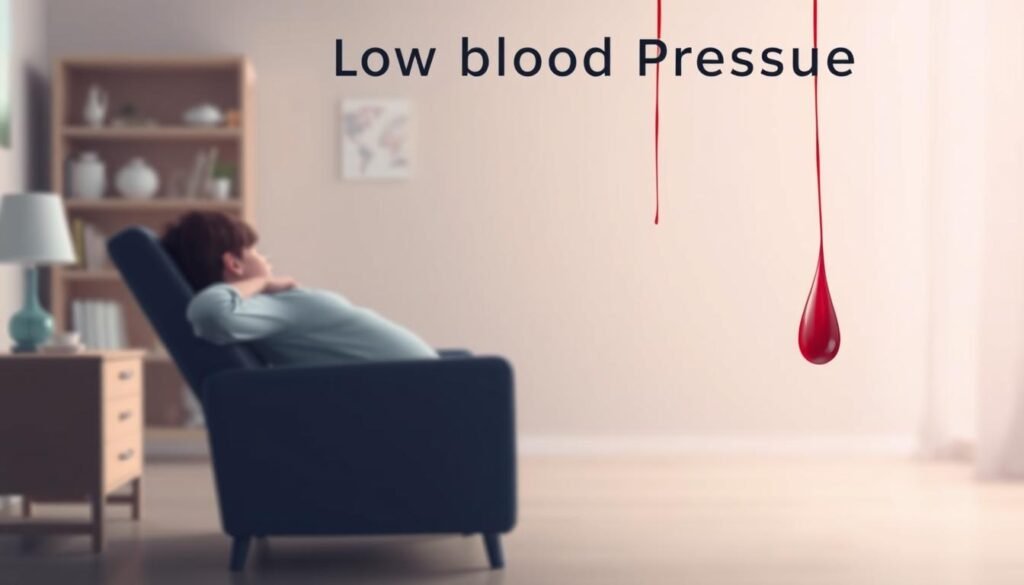Did you know about 60% of adults have had a nosebleed at some point? These events might seem small but can hint at bigger issues like dizziness and fatigue. Understanding what causes nosebleeds and these other symptoms is key. This article highlights how these conditions are connected and ways to manage your health better.
Seeing patterns in your health can help a lot. It makes getting the right medical advice easier when needed. For a deeper look, check out more here.
Key Takeaways
- Nosebleeds can arise from both environmental and lifestyle factors.
- A deviated septum is a common cause of nosebleeds and headaches.
- Fatigue and dizziness can often be linked to more serious underlying conditions.
- Pregnant individuals should be aware of hormonal changes that may lead to headaches and nosebleeds.
- Immediate medical attention is required for nosebleeds lasting over 20 minutes.
- Staying hydrated plays a critical role in preventing fatigue and supporting overall health.
Understanding Nosebleeds
Nosebleeds, or epistaxis, happen when nasal blood vessels break. Most people have had a nosebleed at some point. There are two main types of nosebleeds: anterior and posterior. Anterior nosebleeds come from the front and are common, but usually not serious. Posterior nosebleeds start in the nasal cavity’s back. They can cause a lot of blood loss and are rarer.
Knowing what causes nosebleeds can help prevent them. Dry air, allergies, colds, and bumps to the nose are common triggers. Some medications, like warfarin and clopidogrel, can also cause nosebleeds. If nosebleeds keep happening, it might mean a more serious problem. It’s important to get medical help right away for bad nosebleeds.
To treat a nosebleed, press on the nostrils for 15 minutes. Don’t blow your nose after doing this. There are more treatments for tough cases, like sprays, packing, or surgery. Keeping the nose moist with humidifiers or sprays can prevent nosebleeds. Also, don’t pick your nose.
Most nosebleeds can be handled easily, but some can be serious. Knowing the types of nosebleeds is key. If nosebleeds happen often or are bad, seeing a doctor quickly is wise.
Common Causes of Nosebleeds
Nosebleeds can happen for many reasons that upset the inside of your nose. Knowing these causes of nosebleeds helps spot problems and decide when to see a doctor. They are mostly because of the environment or health issues.
Environmental Factors
The world around us can lead to nosebleeds. Key environmental factors include:
- Dry Air: Dryness from winter or arid places can make the nasal areas crack and bleed.
- Allergies: Season changes can swell and irritate nasal paths, making nosebleeds more common.
- Pollution: Dirty air and irritants damage nasal areas, causing them to bleed.
Medical Conditions
Some health issues make people more likely to get nosebleeds. Important ones are:
- High Blood Pressure: Higher pressure can break blood vessels in the nose, leading to bleeding.
- Blood Disorders: Diseases like anemia or clotting problems can make nosebleeds worse.
- Serious Health Concerns: Often or bad nosebleeds might show bigger health problems, needing a doctor’s checkup right away.
Knowing these causes of nosebleeds allows us to avoid them and get the right help when needed.
| Type | Examples | Description |
|---|---|---|
| Environmental Factors | Dry Air, Allergies, Pollution | Makes the inside of your nose irritated, leading to bleeding. |
| Medical Conditions | High Blood Pressure, Blood Disorders | Raises the chance of getting nosebleeds and points to big health worries. |
Nosebleed Dizziness, Fatigue: Overview of Symptoms
Nosebleed dizziness and fatigue can point to serious health issues. It’s crucial to understand how these symptoms connect to diagnose problems. When you have a nosebleed, you might lose a lot of blood or become dehydrated. This can make you dizzy. Fatigue might mean you’re losing blood too often, or you could be anemic.
Connection between Nosebleeds and Dizziness
Feeling dizzy during a nosebleed is common. Losing a lot of blood can cause your blood pressure to drop. This drop can make you feel lightheaded or even cause vertigo. The nose’s rich blood supply can make this worse. If you often have nosebleeds and feel dizzy, it might be a sign of a bigger health issue. It’s important to get checked out.
How Fatigue Plays a Role
Frequent nosebleeds can lead to long-term fatigue. This tiredness often comes from anemia, which happens when you don’t have enough red blood cells. Trying to recover from losing blood frequently can also make you tired. If you notice these signs, getting medical advice is key. Early recognition helps in dealing with any serious problems.
Low Blood Pressure and Nosebleeds
It’s important to know how low blood pressure links to nosebleeds. If you have low blood pressure, you might feel dizzy and tired. Since nosebleeds can happen for many reasons, understanding this connection is key.
Identifying Symptoms and Causes
Low blood pressure has clear signs. People may feel lightheaded, tired, or their vision might blur. These can come from not drinking enough water, taking certain meds, or heavy bleeding. That includes from nosebleeds.
Really low blood pressure is serious. It can shock your body, hurting your organs a lot if not taken care of quickly. Feeling tired or dizzy can mean low blood pressure. If you also get nosebleeds a lot, it’s time to check your health more closely.
Eating right helps with adrenal health and feeling better overall. A diet with good proteins and water, plus stress management, boosts vitality. To learn more about eating to improve health, click here.

Anemia and Its Link to Dizziness
Anemia often leads to feeling dizzy and tired. This happens when there aren’t enough red blood cells or hemoglobin. Without enough, our brains and tissues don’t get enough oxygen. So, people feel very dizzy and constantly tired.
- Fatigue
- Weakness
- Dizziness
- Headaches
- Sensitivity to temperature
- Cold hands and feet
- Shortness of breath
- Chest pain
- Difficulty concentrating
- Heart palpitations
- Restless leg syndrome
- Cravings for nonfood items
Iron deficiency can be caused by not eating enough iron-rich foods, losing blood often, or diseases that make it hard to absorb iron. A doctor can check for this with a blood test.
| Demographics | Iron Requirement (mg/day) |
|---|---|
| Male Adults | 8 |
| Female Adults (under 50) | 18 |
| Female Adults (50 and above) | 8 |
Treating anemia right is key. Getting iron levels back to normal might take one to two months with the right treatment. For bad cases, you might need even more help. Getting help early is important. It helps reduce symptoms like dizziness and fatigue, making life better.
Dehydration and Its Impact on Health
Dehydration is a big health risk. It can lead to dizziness and tiredness. It happens if we don’t drink enough, sweat a lot, or have certain illnesses. Knowing when you’re dehydrated is key to staying healthy.
Signs of Dehydration
Recognizing dehydration early is important. Look out for these signs:
- Dry mouth
- Decreased urine output
- Headaches
- Lightheadedness
- Constipation
- Bad breath
People with type 1 or type 2 diabetes are more at risk. They might feel thirstier and pee more often. Many don’t know they have diabetes until they get tested, which increases dehydration risk.
Understanding how dehydration affects health encourages us to drink more water. It’s essential for our well-being. Sadly, only about 30% of U.S. adults drink enough water each day. We need to do better.
| Health Impact | Signs of Dehydration |
|---|---|
| Dizziness | Dry mouth |
| Fatigue | Decreased urine output |
| Headache | Lightheadedness |
| Constipation | Bad breath |
Vitamin Deficiencies: A Hidden Cause
Vitamin deficiencies are often missed factors leading to health problems like fatigue and dizziness. People may suffer from vitamin deficiency symptoms that greatly impact their day-to-day lives. Vitamins like B12, D, and iron are very important for keeping energy up and staying healthy.
Feeling tired can often mean the body is missing key nutrients. For example, not having enough vitamin B12 can make someone feel very tired, making daily tasks hard. Not having enough vitamin D is also linked to feeling tired and unwell. Paying attention to what you eat, how you live, and early signs of having not enough vitamins is key.
There’s a clear connection between being tired and not having enough vitamins. Eating well, with lots of fruits, veggies, lean meats, and whole grains, can help with symptoms. Sometimes, to fix big shortages, taking additional vitamins might be needed.
Knowing what vitamins you’re low in can help you eat the right foods to get better. Regular doctor visits and blood tests can make sure vitamin levels are where they should be.
| Vitamin | Common Symptoms | Possible Impact |
|---|---|---|
| Vitamin B12 | Fatigue, weakness, dizziness | Impaired energy levels |
| Vitamin D | Fatigue, muscle weakness | Increased risk of chronic illness |
| Iron | Fatigue, pale skin, shortness of breath | Anemia, decreased oxygen transport |
It’s vital to deal with vitamin deficiencies to improve life quality. Changing your diet and taking supplements when needed can make a big difference. Catching vitamin deficiency symptoms early is very important for managing your health right.
Understanding Excessive Bleeding
Excessive bleeding is a big concern for health. It means losing more blood than what’s normal. It’s worrying, especially when you notice a lot of bleeding from your nose. It’s vital to know when bleeding is too much so you can take care of your health right away.
What Constitutes Excessive Bleeding?
Excessive bleeding is when you lose blood for over 20 minutes or bleed a lot. This can be a sign of serious health problems like coagulopathy or bleeding disorders. When thinking about excessive bleeding, here are some things to watch out for:
- Duration of bleeding: If it takes too long to stop, it might be serious.
- Volume of blood lost: Losing a lot of blood, particularly from a nosebleed, means you might need to see a doctor fast.
- Associated symptoms: Feeling dizzy, very tired, or seeing unusual bruises could mean there’s a bigger problem.
People who have polycythemia vera are at higher risk of having bad bleeding episodes. This condition is found in about 50 people out of every 100,000 in the U.S. Those with leukemia are also prone to nosebleeds because their platelet counts are low. This raises their bleeding risk.
It’s important to understand the dangers of bleeding too much. Sometimes, seeing a doctor for tests is needed. This helps find out the reason for the bleeding and the best way to treat it.

| Condition | Risk Factors | Symptoms |
|---|---|---|
| Polycythemia Vera | Age over 60, genetic predisposition | Fatigue, dizziness, increased bleeding |
| Leukemia | Chemotherapy, smoking, exposure to chemicals | Nosebleeds, bruising, fatigue |
| Coagulopathy | Inherited disorders, liver disease | Excessive bleeding, easy bruising |
High Altitude Sickness: Symptoms to Watch For
High altitude sickness is a big concern for adventurers heading to tall mountains. It often starts affecting people above 8,000 feet. Symptoms like dizziness and nosebleeds can appear. Knowing what to look out for is key to manage the condition.
The likelihood of getting high altitude sickness goes up as you climb higher. Around 20% feel it at 8,000 feet and 40% at 10,000 feet. Common signs include dizziness, headaches, and sometimes nosebleeds.
Some might only feel mild issues such as muscle pain, moodiness, and not wanting to eat. But serious forms like high altitude cerebral edema can cause confusion or trouble walking. Rising quickly to high places increases these dangers, especially for those with existing health issues. It’s important to recognize these symptoms before heading up high.
The following table summarizes key symptoms of high altitude sickness and their potential effects:
| Symptom | Description |
|---|---|
| Dizziness | A feeling of light-headedness, often associated with reduced oxygen availability. |
| Headaches | Commonly occur due to pressure changes and oxygen depletion. |
| Nosebleeds | May arise from increased pressure and dryness at high altitudes. |
| Muscle Aches | Discomfort in muscles, typically due to decreased oxygen levels. |
| Shortness of Breath | Occurs with physical exertion as oxygen saturation declines. |
| Insomnia | Difficulty sleeping, often exacerbated by discomfort and altitude adjustments. |
It’s vital to recognize the signs of high altitude sickness for timely steps. Slowly getting used to higher altitudes and staying hydrated can lessen the impact. If symptoms don’t improve, getting medical help is crucial to avoid worse problems.
When to Seek Medical Attention
Nosebleeds are quite common. In fact, about 60% of people will have one at some point. It’s important to know when to worry. If you feel dizzy or if the nosebleed happens with other symptoms, it’s time to be cautious.
Seek help if the bleed is heavy or stops you from breathing well. If it goes on for more than 20 minutes, get help quickly. Injuries causing nosebleeds can be serious, like a broken nose or even a cracked skull.
Feeling tired or weak with a nosebleed? See a doctor. This could mean something else is wrong, not just the nosebleed.
If you’re bleeding from other areas, like gums or ears, it’s critical to get checked out. This might show you’re having serious issues, such as internal bleeding or problems with how your blood clots.
People on blood thinners need to be extra careful. Their nosebleeds can be worse. They should know when to go to the doctor to stay safe.
The following table outlines when medical attention is necessary:
| Situation | Recommended Action |
|---|---|
| Nosebleed lasts more than 20 minutes | Seek immediate medical attention |
| Excessive bleeding obstructing breathing | Call emergency services |
| Bled from other body parts | Consult a healthcare provider urgently |
| Symptoms of dizziness and weakness | Visit a doctor immediately |
| Use of blood-thinning medications | Monitor closely and consult if issues arise |

Conclusion
Nosebleeds, dizziness, and fatigue might hint at various health issues, from minor to serious. Knowing how these symptoms link is key to managing your health. If these problems come from things like the environment, low blood pressure, or not getting enough vitamins, acting early can reduce trouble.
Some good steps to prevent these symptoms include drinking plenty of water, using saline nasal sprays, and fixing any vitamin shortages. It’s also important to know when to see a doctor, especially if symptoms don’t go away or get worse. Taking care of your overall health and listening to what your body tells you helps fight fatigue and improve your life.
By getting educated and talking to doctors, people can deal with these symptoms well. This leads to a more stable and healthy way of living. Spending time to learn about these health issues is a smart move for better health management.